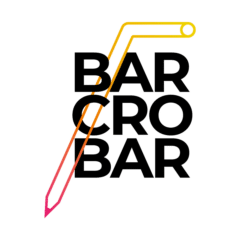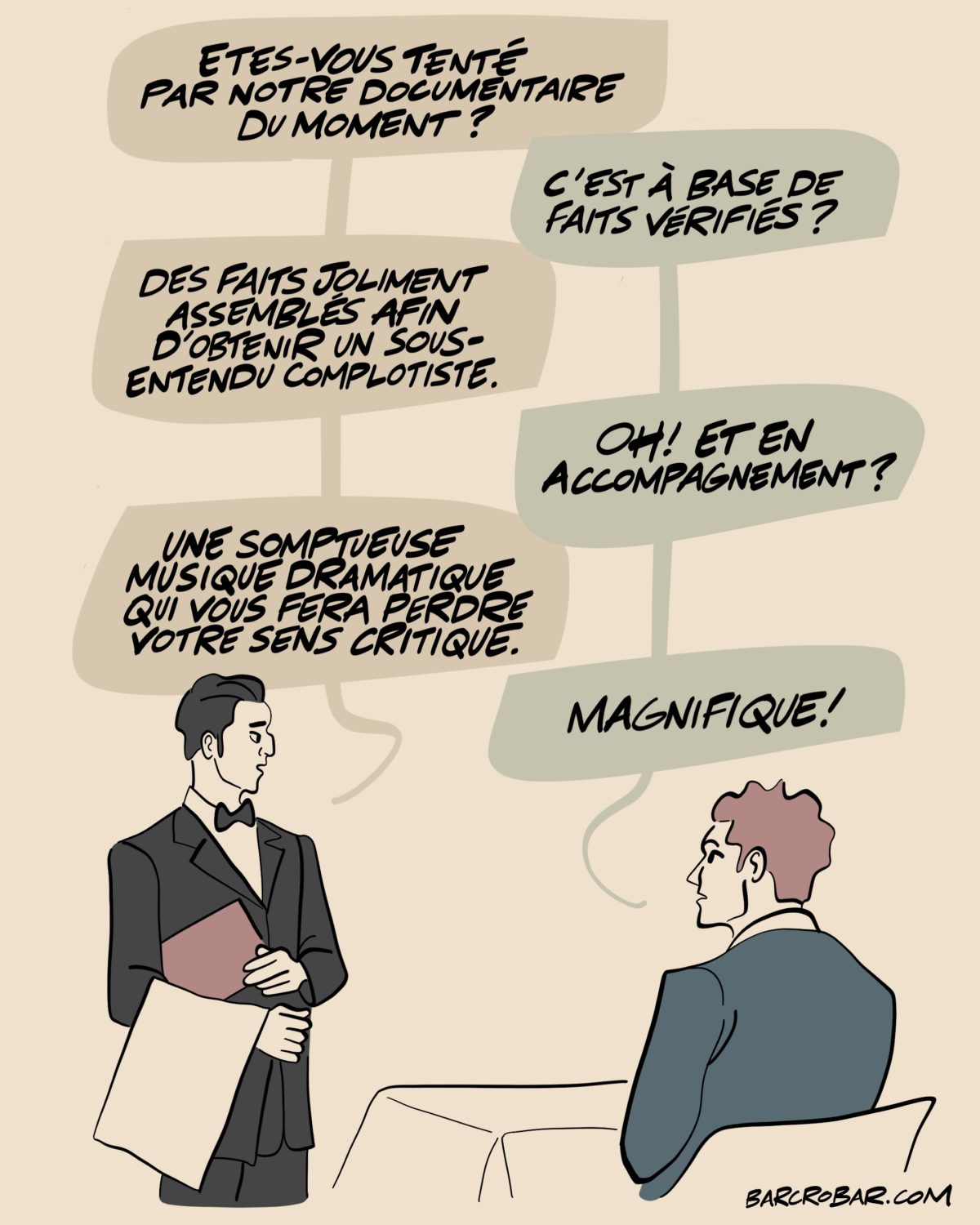SCIENCE - It's what you might call a runaway success. Released on Wednesday 11 November, the documentary devoted to Covid-19 "Hold Up - a look back at chaos" is at the heart of discussions in many media and on social networks.
On the Tipeee crowdfunding platform, the Tprod production company went from receiving 28,000 euros in monthly funding to over 110,000 euros in 24 hours, as noted by Tristan Mendès-France, a researcher specialising in digital technology and conspiracy circles. The various extracts from the film posted on social networks have accumulated hundreds of thousands of views. And given the sums already amassed, the target of 200,000 euros a month to make the film available free of charge could well be quickly reached.
But what exactly does this documentary, which has been accused of peddling a conspiracy message, say? Le HuffPost has watched it in its entirety, and below we take a look at some of the false information spread by "Hold-Up" on the coronavirus and management of this global pandemic. This article will be updated regularly.
The Great Reset
Before going into detail, we need to return to the main thesis of this documentary, which takes two hours to appear on screen. According to "Hold-Up", this pandemic was organised by political, economic, intellectual and technological elites to bring about a "Great Reset" of society.
The World Economic Forum is planning to hold a major meeting in January 2021. This was announced in a press release in June. The aim of this project is to devise an "economic and social system for a fairer, more sustainable and more resilient future" in the face of pandemics, climate change and other challenges.
While it is perfectly legitimate to debate the true usefulness of the World Economic Forum and this meeting, to assert that this "Great Reset" has been in the works for a long time is factually inconsistent. The documentary presents no evidence to support this claim.
Still without proof, the authors claim that the purpose of this pandemic for the global elites is both to destroy a useless part of humanity, but also to facilitate the deployment of 5G to better control money, via the virtualisation of money through cryptocurrencies.
It may sound like a big deal when you put it like that. But after two hours of debate on the origins of the coronavirusWhen we look at the real impact of Covid-19, mortality, treatments and the ethics of confinement, we are legitimately keen to hear a solution that explains all this.
Except that the overwhelming majority of what we've heard before is also either false, exaggerated or misleading. Here are a few examples. Many are conspiracy theories or approximations that have been around for months.
The efficacy of hydroxychloroquine
It's one of the subjects that has led to the most debate and polarisation, not only on social networks, but also among doctors and politicians. So it's only logical that Hold Up should take up the subject.
There are many claims to be made on this subject, and it would be futile to try and review them all. It is clear, however, that the documentary asserts that hydroxychloroquine is a highly effective treatment for Covid-19. Hold Up also states that the reason this drug was not authorised was precisely because there was a large-scale conspiracy to ensure that the drug was not authorised. coronavirus cannot be treated until a vaccine arrives.
After several months of debate, there are some clear points to be made about chloroquine. Firstly, it should be remembered that in the early months of the pandemic, we didn't know what to do about the disease. coronavirus. It therefore makes sense to test existing drugs, such as chloroquine and Remdesivir (which is heavily criticised in Hold Up because it comes from the Gilead laboratory, which is supposed to be part of a grand conspiracy).
Some drugs seemed to be effective, but the results were only partial. One of these was hydroxychloroquine, which Didier Raoult was promoting at the time. The question of whether doctors should be allowed to prescribe is a debate in its own right (more information here). However, it is clear that the media coverage of this debate, particularly as a result of the statements made by the professor from the Marseille IHU and by Donald TrumpThese controversies, which are commonplace in the medical world, have not been helped. And they have had undesirable effects.
But things have moved on since then. Behind these ethical debates, there is scientific research that has tried to move forward quickly (more details here), to produce high-quality, robust studies that can tell us with much greater certainty whether the existing drugs tested in the emergency were of any use against Covid-19.
Hold Up also talks a lot about the famous study published in The Lancetwhich led the WHO to suspend (and then resume) its analysis of the efficacy of hydroxychloroquine. And rightly so. These problems were raised by scientists and the media (summarised here). The study was retracted by the scientific journal and research continued to progress. On the other hand, Hold Up does not mention the many approximations and untruths expressed by Didier Raoult in his various interviews or in some of his studies.
The fact remains that today, after all the debate and controversy, we know a lot more about Covid-19. Dexamethasone is one of the only drugs with truly proven efficacy in well-controlled double-blind clinical trials, and no-one had really bet on it. Conversely, a large number of clinical trials have concluded that chloroquine is effective. The two largest of these, from the WHO (solidarity) and Oxford University (recovery), all agree that hydroxychloroquine has no effect.
Researchers also carried out a meta-analysis and found no impact. This study is heavily criticised in Hold Up, but the majority of other similar analyses point in the same direction.
The mask for non-patients is an "aberration".
Pascal Trotta, a nutritionist and anti-vaccine doctor, states in "Hold-Up" that "doctors who put masks on people who aren't ill are fools, Molière's doctors".
The usefulness of the mask was debated at length at the start of the epidemic, as we have explained several times. And not to mention the mistakes made by the various governments, even the scientists disagreed. But after more than 11 months, there are some things we know that constitute a scientific consensus. This consensus is created by the accumulation of studies, tests, analyses and observations.
This is very clear: it is possible for a person infected with coronavirus transmit the disease without showing any symptoms. Particularly in the 48 hours before symptoms appear. It is also increasingly clear that masks reduce the risk of contamination.
Logically, if the coronavirus circulates widely in a population, asking people to wear a mask should reduce the proportion of pre-symptomatic or asymptomatic people who will contaminate healthy people.
There has been a bonus for doctors who "blow the whistle".
The documentary claims that doctors were rewarded for reporting Covid-19 cases and their contacts. It is true that the issue was the subject of debate in May, when the government was putting in place its decontainment strategy, based in particular on contact tracing.
But as LiberationHowever, when the law was finalised by the joint parliamentary committee, the issue of remuneration for this tracing work was dropped. On the other hand, it is true that for a sick patient whose PCR test confirms that he or she is indeed affected by the coronavirusthe doctor gets a bonus.
Why should I do this? Health insurance explained to LiberationThis increase corresponds to the value of the announcement of the positive test, the prescription of tests for close contact cases [...], the information given to the patient on barrier measures, and the registration of the patient and close contact cases in the "Contact Covid" tool".
The WHO has banned autopsies on Covid-19 victims
In "Hold-Up", we hear a doctor explain that autopsies are useful for finding out how best to treat Covid-19 patients. Just before this, the documentary states that the WHO had in fact banned autopsies.
However, a visit to the World Health Organisation's website shows that this is not the case. A document published on 24 March lists the precautions to be taken during an autopsy on a patient who has died of Covid-19 in order to avoid possible infection. This AFP article provides a detailed update on this issue.
The virus was created in a laboratory
It's one of the theories that has circulated the most on social networks. And in many different forms. In "Hold-Up", while some contributors explain that they do not have the answer to the origins of Sars-Cov2, others are more categorical. Like Jean-Baptiste Fourtillan, an anti-vaccine campaigner known for having taken part in a wild clinical trial in an abbey, who claims that the new coronavirus is a Sras genetically modified with bits of the malaria genome. The proof is in the patents.
The origin of Sars-Cov2 is still unclear, but this hypothesis of genetic modification is rejected by the scientific community, especially as these patents do not at all mean that the virus was "created" years earlier, as we explained in March.
The genome of the coronavirusThe Sars-Cov2, which has been studied in detail for 11 months, does not seem to support the theory that it was modified by humans, for a number of reasons (more details here). In particular, this theory gained momentum after an investigation by the US intelligence services in April, which finally concluded that Sars-Cov2 was not man-made.
The scientific community still does not know exactly how it reached humans. An intermediate host, such as the pangolin, could have been the link between the bat and man, but the debate remains open.
A law on containment from 2019
After an hour and a half, "Hold-Up" slowly begins to lead the viewer down the path of a long-planned plot, a way of preparing the ground for the thesis of a "Great Reset" fomented in the shadows. The documentary then refers to a French law that would have made "confinement legal"... from December 2019.
When questioned, MP Martine Wonner, who was expelled from the LREM group for her (sometimes questionable) positions on the coronavirus, wondered: "It's very surprising, I admit to you that it's practically been passed over in silence", explaining that "we can ask ourselves the question".
The text in question is not specified, but on the Senate website there is a "health security bill" dated 5 December 2019. It refers to "eviction and home maintenance measures" for "persons presenting a high risk of developing a transmissible disease". Another article in the proposal refers to compulsory isolation measures "when a person suffering from a highly contagious transmissible disease creates a serious risk to public health by refusing to comply with medical prescriptions for prophylactic isolation".
But you only have to look at the explanatory memorandum to this law to put all this into context and understand that there were reasons prior to Covid-19 to justify this law. "Our country is facing growing difficulties in the face of the development of vector-borne diseases transmitted by insects, such as dengue fever, chikungunya, zika and yellow fever", says Senator Michel Amiel. A few months earlier, the Zika virus was contracted for the first time in mainland France.
The senator also mentions the return of measles, which highlights "that the State does not have all the necessary means of action". In 2019, France is being singled out along with other countries for the return of this disease, which was thought to have been brought under control. The fact that the French population is one of the most opposed to vaccines is no coincidence.
By Grégory Rozières Head of the C'est Demain, Science and Technology section

